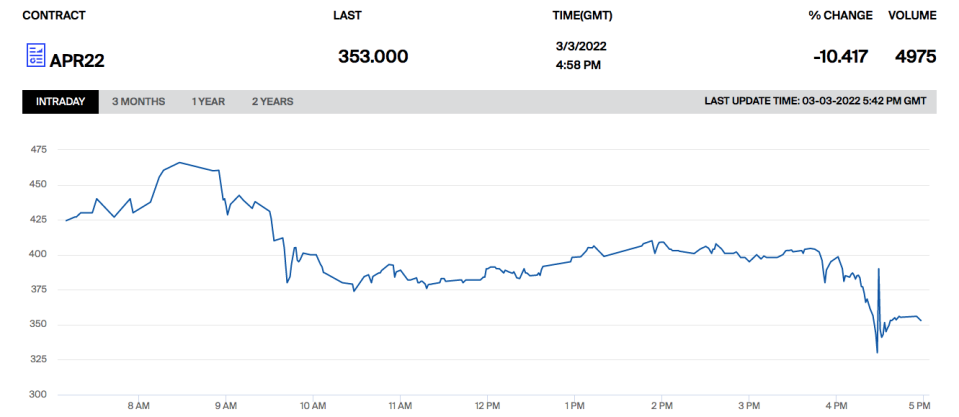Germany rules out energy sanctions on Russia amid spiralling gas prices

Germany has played down the prospect of oil and gas sanctions on Russia, with economy minister Robert Habeck warning such measures could “threaten the social peace”.
Habeck revealed he would not support an embargo on Russian imports and would “even speak out” against any proposals, given the country’s heavy reliance on its supplies.
Last month, Germany suspended the Nord Stream 2 pipeline – which would have doubled its imports from Russia – but still depends on Russia for around half its natural gas.
So far, the West’s sanctions on Russia have not included energy specific measures, with oil and gas deliveries into Europe remaining steady since the country’s invasion of Ukraine.
Nevertheless, the potential for conflict-driven disruption to gas flows and changing market behaviour to steer clear of stringent measures has raised the prospect of disruptions to natural gas supplies.
Gas prices remain elevated as supply fears loom large
Gas prices across the UK and Europe have remained elevated amid escalating fears of supply shortages as the West bolsters sanctions against Russia following its invasion of Ukraine.
European gas prices soared to record levels on the Dutch TTF Futures benchmark this morning at $220 per megawatt hour, before easing later in the day – the price was below €16 this time a year ago.
The elevated prices and fears of supply shortages are particularly an issue for the European Union – as the trading bloc depends on Russia for about 40 per cent of natural gas.
So far, the Kremlin has committed to continue trading energy with global markets, however Gazprom supplies are reportedly at decade lows in European storage, with buyers preferring established supplies in storage to paying premium spot prices.
Meanwhile, multiple energy giants have exited the country including BP, Shell and ExxonMobil.
UK benchmarks also remain close to record levels.
This could worsen the current crisis in the UK’s domestic energy market, with Investec, Goldman Sachs, Cornwall Insight and trade body Energy UK all warning over the past week that the consumer price cap could spike to around £3,000 per year for UK households this October.

Earlier today, the International Energy Agency (IEA) argued Europe could reduce its imports of Russian gas by more than a third within a year, announcing a 10-point plan to cut the bloc’s dependence on Russian gas.
This included boosting renewables, bringing in minimum gas storage obligations, and not signing any more contracts with Gazprom for its fossil fuels.
The IEA also suggested Europe could secure about 30bn cubic metres of gas a year – about 20 per cent of what Russia usually supplies – from Qatar, the United States and others.
Executive director Faith Birol said: “Russia’s use of its natural gas resources as an economic and political weapon show Europe needs to act quickly to be ready to face considerable uncertainty over Russian gas supplies next winter.”
The Kremlin has consistently denied using gas as a weapon. while Gazprom has met all of its long-term contracts, even though flows dipped sharply in 2021.